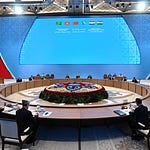
This week’s episode of the CAPS Unlock podcast delves into the freshly agreed Kyrgyzstan-Tajikistan border treaty, which will almost have been signed by the countries’ president soon after this edition is released, and Uzbekistan’s anti-corruption shake-up.
And for this week’s interview, we speak with Aizhan Alzhanova, a representative of Mama Pro, a Kazakhstan-based organisation dedicated to supporting mothers of children with special needs.
With all discussions on the Kyrgyzstan-Tajikistan border now concluded, attention is turning to technicalities related to trade, logistics, and energy. One notable development is Kyrgyzstan’s proposal to serve as a “green corridor” for Tajik goods entering the Eurasian Economic Union – an idea that raises questions about Moscow’s stance on the matter.
Beyond trade, diplomatic efforts are also opening up long-shut transport routes. The long-awaited reopening of the Kyrgyz-Tajik border and the resumption of flights between Bishkek and Dushanbe could mark a turning point for connectivity in the region. These steps aim to super-charge trade to $500 million by 2030. That is a colossal amount compared to what trade is done now.
Uzbekistan’s President Shavkat Mirziyoyev bared his teeth addressing the National Anti-Corruption Council last week. In a tetchy speech, he declared the current fight against graft ineffective and promptly dismissed 117 anti-corruption officials from various government agencies. These positions, introduced in 2023, were meant to provide internal oversight, but their removal suggests either signs of fracture among the ruling elite or, more simply, a failure of decentralised enforcement.
Despite these setbacks, Mirziyoyev highlighted some positive trends, claiming $1.1 billion was saved in 2024 through transparency reforms in public procurement and licensing processes. However, the scale of the problem remains immense. Official data from January revealed that 5,000 officials were prosecuted for corruption last year, a 37 percent increase from the previous year.
In her interview to CAPS Unlock, Aizhan Alzhanova, project development manager at Mama Pro, spoke about how some mothers with the complicated challenge of raising children with disabilities have managed, despite their difficulties, to build successful businesses. They have done so with help from Alzhanova’s organisation, which provides business training, psychological support, and a strong community network to help women raising children with special needs achieve financial independence.
















Share this post